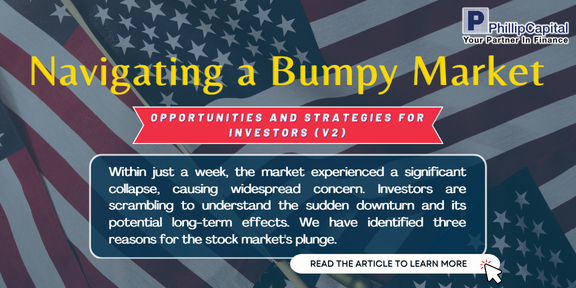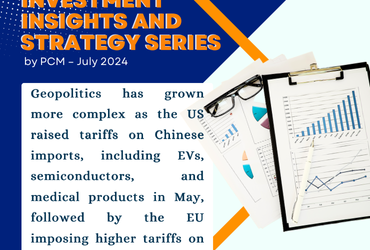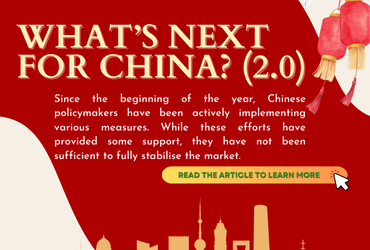
Within just a week, the market experienced a significant collapse, causing widespread concern. Investors are scrambling to understand the sudden downturn and its potential long-term effects. We have identified three reasons for the stock market’s plunge.
#1 – Economic data points to U.S. slowdown
- Institute for Supply Management (“ISM”) report indicated a deepening contraction in the manufacturing activity and poor employment figures, as companies in the US only added 114,000 new positions in the month of July 2024, below expectations of 150,000 and much lower than the 215,000 average gain over the past 12 months.
- Separately, July 2024’s unemployment rate of 4.3% was also higher than market expectations, June 2024’s rate of 4.1% and a full percentage point higher than the readings were at the start of the year.
- Goldman Sachs Group on Sunday raised the probability of a recession within the next year from 15% to 25% but see the risk as “limited,” Bloomberg reported.
- The Fed’s decision to hold interest rates in July’s FOMC meeting at a 23-year high further dampened sentiments.
#2 – AI worries + Concerns on Tech’s lofty valuations
- Traders are beginning to unwind big trades on Apple, Nvidia, Microsoft, Meta, Amazon, Alphabet and other tech stocks that had been surging since the beginning of last year.
- Warren Buffett — CEO of Berkshire Hathaway had sold half of Berkshire’s Apple stake, which is a troubling sign for the health of the tech sector.
- Another trigger for the sell-off was when Biden announced new US rule to stop foreign chip equipment exports to China. This is to prevent firms in China from using advanced technology for artificial intelligence, including advanced semiconductors, as the burgeoning sector raises security concerns. Towards the end of July, it was announced that US allies, including Japan, Netherlands and S.Korea to be excluded in new China chip exports rule
- Intel reported disappointing Q2 financial performance, announced $10bn cost reduction plan, shares plunged >20%
#3 – Japan’s interest rate hike
- The recent market weakness was further exacerbated by a hawkish stance from the Bank of Japan (BoJ). BoJ raised short-term policy rates by 15bps to 0.25% and reduced monthly JGBs purchase to JPY3tln by 1Q26 in the face of economic data and weak JPY
- This had prompted investors to unwind the “yen carry trade”. A carry trade is a hugely popular trading strategy where an investor borrows from a country with low interest rates and a weaker currency (i.e. JPY) and reinvests the money in assets of another country with a higher rate of return.
- Weak JPY boosted export-oriented markets like Japan, but the trend has now reversed. Japanese stocks crash in biggest one-day drop since 1987 as global market rout intensifies. Trading was halted for short periods of time Monday in Japan and South Korea as circuit breakers designed to prevent panic selling were triggered multiple times.
- Global equity markets extended their rebound after Bank of Japan (BOJ) Deputy Governor Shinichi Uchida said the central bank would not raise rates when financial markets are unstable, pushing the yen lower and boosting market sentiment
And now, market’s expectation on rate cut shifted dramatically in just a week (see Figure 1). The Fed’s first rate cut is now highly likely to occur in September, with expectations shifting from 25 bps to 50 bps. A weaker dollar eases the burden on deficit-laden governments and could potentially attract foreign inflows returning to emerging markets. Separately, Chinese policymakers defended the yuan for a year, awaiting Fed rate cuts. A Treasury rally reduced US yields, easing pressure on the yuan, giving China more room to ease to boost growth if the Fed starts cutting rates.
Figure 1: Rate cut expectations increased to 50 bps for September

Source: CME Fed Watch Tool, 31 July 2024 (Left) & 8 August 2024 (Right)
In terms of positioning, we remain cautiously optimistic about the market, viewing the sharp correction as a potential buying opportunity for those who previously considered it too expensive.
Many equity funds (Global, Asia, Malaysia) have corrected by >20% from their peak in mid-July.
Our outlook for Malaysia and Regional market is as follows:
MALAYSIA
- KLCI gained 11.8% over 7M24, driven by economic restructuring and fiscal reforms, record FDI/DDI, and strong corporate earnings momentum with upgrade by JP Morgan and on anticipation of cut in Fed rates in September. With the sudden fear of recession (probability of US recession in 2025 raised from 5% to 25-50%) due to much lower non-farm payroll that caused the collapse of US markets especially among the tech stocks. or even earlier. As our funds are mostly heavily invested, we may have to do switching strategy by selling stocks that have fallen less and buy more on stocks that have fallen more substantially. For investment where we intend to go for longer term, we will need to raise the portfolio beta but cautiously.
REGIONAL
- We think upcoming political election in the US will be the key event that may introduce greater policy uncertainties, which could have implications for sector positioning and security selection. Our analysis indicates that the investment case for US remains robust, bolstered by the corporates’ resilient earnings quality. Additionally, there is potential for a mean reversion trade given the deeply discounted valuations observed in the Chinese market. India has been one of the best-performing markets globally in local currency terms and has kept pace with US markets in dollar terms in recent decades.
- A US recession will impact on the global economy which will means lower demand for oil and other commodities as well as manufacturing goods worldwide. US companies will also be faced with slower domestic economy and hence impact on corporate earnings. Based on past experience, market will be weak in the immediate terms but will recover when investors see the benefit of rate cut by the Fed which is initially scheduled for September. With the collapse of the US stock market as well as the plunge of Japanese stock market, the Fed is likely to accelerate the rate cut by 0.5% instead of 0.25% in September.
Phillip Capital Malaysia and our offerings
We reaffirm our belief that there are still opportunities in the market, and we maintain a discerning approach in choosing high-quality stocks for our portfolio. However, it is crucial to exercise caution and carefully select investment options to ensure the best risk-adjusted returns. By taking a vigilant and discerning approach, investors can potentially reap the benefits of the current market opportunities while minimising risks.
A noteworthy avenue for investors seeking diversification in their portfolio is through PhillipCapital Malaysia. PhillipCapital Malaysia offers multiple private mandate services managed by professional fund managers. By leveraging PhillipCapital Malaysia’s private mandate services, investors can enhance their resiliency, optimise portfolio performance, and navigate the complexities of the market with confidence.
We also offer both conventional and Shariah-compliant options to cater to the needs of all investors. For Malaysia’s mandates, we like:
- PMART/PMA Dividend Enhanced and/or PMART/PMA Dividend Enhanced ESG
Our PMART Dividend Enhanced and PMA Dividend Enhanced is an income-driven portfolio focused on high dividend-yielding equities. We apply the Dog of the Dow approach, screen and select top market cap stocks to minimise risk and ensure consistent performance. The portfolio is an equal weighting portfolio which reduces concentration risk and provides similar exposure to all clients, both initially and after rebalancing. We offer both conventional and Shariah investment options to cater to the diverse needs of our investors. Click here to learn more. We recently also introduced PMART/PMA Dividend Enhanced ESG Mandate as we remain dedicated to investing in ESG stocks given their stronger valuation and profitability.
- PMART/PMA ESG
Phillip Capital Malaysia offers discretionary portfolio that invests in stocks with high ESG ratings from the F4GBM and F4GBMS Indices, namely PMART and PMA ESG. There are both conventional and Shariah options available. To explore the companies in which both Conventional and Shariah ESG mandates invest, you can refer to the provided link.
- PMART/PMA Blue Chip and Opportunity
Our Blue-Chip portfolios primarily allocate our investments towards companies with large market capitalisations, while the Opportunity portfolios predominantly invest in companies with smaller market capitalisations. We also offer both conventional and Shariah-compliant options to cater to the needs of all investors.
Please click on the link to learn more or email us at cse.my@phillipcapital.com.my if you require any further information.
Disclaimer:
The information contained herein does not constitute an offer, invitation or solicitation to invest in Phillip Capital Management Sdn Bhd (“PCM”). This article has been reviewed and endorsed by the Executive Director (ED) of PCM. This article has not been reviewed by The Securities Commission Malaysia (SC). No part of this document may be circulated or reproduced without prior permission of PCM. This is not a collective investment scheme / unit trust fund. Any investment product or service offered by PCM is not obligations of, deposits in or guaranteed by PCM. Past performance is not necessarily indicative of future returns. Investments are subject to investment risks, including the possible loss of the principal amount invested. Investors should note that the value of the investment may rise as well as decline. If investors are in any doubt about any feature or nature of the investment, they should consult PCM to obtain further information including on the fees and charges involved before investing or seek other professional advice for their specific investment needs or financial situations. Whilst we have taken all reasonable care to ensure that the information contained in this publication is accurate, it does not guarantee the accuracy or completeness of this publication. Any information, opinion and views contained herein are subject to change without notice. We have not given any consideration to and have not made any investigation on your investment objectives, financial situation or your particular needs. Accordingly, no warranty whatsoever is given and no liability whatsoever is accepted for any loss arising whether directly or indirectly as a result of any persons acting on such information and advice.






